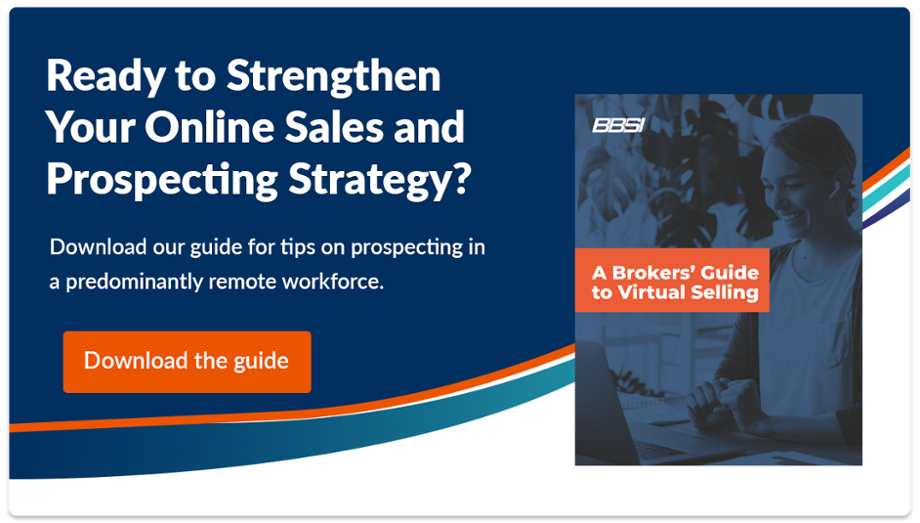How to Perfect Your Health Insurance Pitch To SMBs

There are over 33 million small businesses in the United States, and if you’re a life and health insurance broker, tapping into this market segment can take your business to the next level. However, the strategies used to sell health plans to large businesses don’t necessarily work with small to medium-sized businesses (SMBs). After all, small business owners have a unique set of needs, responsibilities, and budgetary constraints.
Understanding the Small Business Market
In the US, 99.9 percent of businesses are considered SMBs. Small businesses have 100 or fewer employees, while medium businesses have between 100 and 999.
According to the Affordable Care Act, businesses with fewer than 50 full-time employees don’t have to offer health insurance. Even so, many SMB owners are motivated to provide their employees with a benefits package as a form of retention and additional financial support.
The greatest challenge SMBs face when it comes to health insurance is rapidly rising costs. In fact, surveys show health insurance costs are one of SMBs’ top two issues, along with attracting new customers.
Identifying Your Ideal SMB Clients
If you want to specifically target SMBs, the first step is to narrow your focus. After all, there are a lot of SMBs out there, and some industries may be a better fit than others.
Take some time to define what would make an SMB a “good fit” for your insurance offerings. After that, you can find out if prospective clients fit this category by:
- Asking about their needs: Every SMB has distinct needs based on their employee count, legal requirements, and long-term goals. You should ensure your offerings align with a prospect’s needs before you try to close a sale.
- Seeking out shared values: It’s much easier to sell to SMBs if you have shared values. For instance, maybe you prefer working with clients who truly value their employees’ health and well-being. These SMBs will be more motivated to select the best healthcare plans instead of hunting for the cheapest options.
- Allocating responsibilities: Some clients may be willing to do some of the required administrative work, such as keeping their databases up to date, while others may not.
- Reviewing their insurance history: SMBs that have offered healthcare coverage in the past may be more informed about the process than those who are inquiring for the very first time.
- Taking note of their turnover rate: High employee turnover can increase the health insurance data entry burdens of an SMB.
By working with the right SMBs, you can allocate your time and resources to businesses that align with your company’s core values and grow your book in the process.

What Are Common Sales Discussions Pitfalls, and How Do You Avoid Them?
Perfecting your sales pitch is crucial if you want to attract business from your preferred SMBs. It is also helpful that business owners are typically much savvier than the average insurance consumer. This is because they don’t just have their own needs in mind; they also have to consider their employees and their employees' families.
As you approach introductory discussions, here are six common sales pitch pitfalls and how to avoid them:
- Selling only on price: When it comes to health insurance, cost is a significant factor. However, quoting low prices won’t help you win over clients’ long-term loyalty. Instead, you should highlight how your health plans offer the best value for their money. You can also leverage how providing quality health coverage can help SMBs retain top talent.
- Selling out of your own pocket: Some insurance brokers assume their prices are too high for SMBs before speaking to them. Rather than approaching clients with your own assumptions, consider that many SMBs will be willing to pay more for high-quality health plans. They just need good reasons to support their decision, and you can provide those supporting arguments.
- Not listening: During a sales pitch, you may be eager to explain all of the benefits of your health plans. However, spending more time listening to your prospects’ needs and asking follow-up questions is a much better strategy. This way, you can act as a consultant and tailor your offerings to best suit their needs.
- Multitasking: As an insurance broker, you likely have a lot on your plate. Even so, you don’t want to fall into the trap of multitasking while you’re on a sales call. Research shows that people are only 40% as productive on each task when they multitask. A better strategy is to time-block your days so you can give sales meetings your undivided attention. Even if you think deleting spam emails doesn’t require any mental bandwidth, this can still lower your overall attention, which would be better spent on closing a new deal.
- Selling features instead of solutions: While it’s tempting to list out all of the attractive features of your health plans, you’ll be more successful if you showcase the real-world solutions you can provide for the businesses’ pain points.
- Fixating on the finish line: You may be eager to close as many deals as possible. However, rushing from one sales meeting to the next can hurt your business if you never carve out time to re-evaluate your sales processes. You can work smarter instead of harder by optimizing your sales processes incrementally over time.
Creating a Compelling Value Proposition
A value proposition is a concise statement that communicates your unique value to customers and specifies what type of customers you serve. Your value proposition should give SMBs a persuasive reason to choose you over your competitors, and ideally, should only be two to three sentences.
Here are some tips for crafting a value proposition that will resonate with SMBs:
- Conduct research to learn more about the market segment you’re targeting
- Explain how these businesses will benefit from your offerings
- Identify what differentiates you from your competitors
Once you’ve perfected your value proposition, feature it on your website and marketing materials. You can also tie it in throughout your sales pitches.
Overcoming Objections and Closing Sales
SMBs often have similar objections to purchasing health insurance plans. Planning your response to these objections ahead of time can help you close more sales on the spot.
The most common objections SMBs have toward purchasing new insurance plans have to do with need, urgency, trust, and budget.
Here’s how you can overcome these obstacles:
- Need: Many SMBs may claim to be happy with the status quo, whether they provide mandated health coverage or not. To earn their business, you’ll need to show them why your offerings can better meet their needs than their current (or non-existent) health plans. Start by listening to these prospects to get a sense of where they’re coming from. After that, explain how your plans can address their unique pain points. You can also touch on the opportunity costs of not making the switch.
- Urgency: You can encourage faster sales by quickly identifying the decision-makers at an SMB and contacting them directly rather than spending time going up the chain. Once you’re speaking to these decision-makers, share informative materials with them and ask targeted questions.
- Trust: Consumers often have preconceived notions about salespeople, especially in the area of “trust.” Business owners may be even more skeptical since they use sales tactics themselves. Rather than acting as a salesperson, position yourself as a trusted advisor and explain how your health plans will benefit your prospects’ bottom lines. If your plans aren’t the best fit for a prospect, communicate this directly and be prepared to cut your losses and move on to the next. Doing so will prove your integrity and protect your reputation. If this compels the business owner to work together despite the communicated issues, your partnership will move forward on a sturdy foundation of trust.
- Budget: SMBs are more likely to perceive health plans as “too expensive” if they don’t understand their value. That’s why presenting a compelling value proposition is so important. You can also use competitor comparisons to bolster your sales pitch. Remember to validate your clients’ purchase decisions so they leave meetings feeling reassured.
Optimize Your Health Insurance Sales Strategy with BBSI
There’s great business potential in selling health insurance to SMBs. You can perfect your sales pitch by pursuing SMBs that are a good fit, constructing a compelling value proposition, and empathetically addressing hesitant prospects’ objectives one by one.
If you want to work with a true partner and offer unique plan designs customized to SMBs, consider partnering with BBSI. As an experienced PEO, we offer payroll, HR, risk and safety, benefits, and business consulting services to SMBs.
By partnering together, we can work to grow your book and provide our mutual clients with comprehensive business solutions. Reach out to BBSI today to learn more.
Disclaimer: The contents of this white-paper/blog have been prepared for educational and information purposes only. Reference to any specific product, service, or company does not constitute or imply its endorsement, recommendation, or favoring by BBSI. This white-paper/blog may include links to external websites which are owned and operated by third parties with no affiliation to BBSI. BBSI does not endorse the content or operators of any linked websites, and does not guarantee the accuracy of information on external websites, nor is it responsible for reliance on such information. The content of this white-paper/blog does not provide legal advice or legal opinions on any specific matters. Transmission of this information is not intended to create, and receipt does not constitute, a lawyer-client relationship between BBSI, the author(s), or the publishers and you. You should not act or refrain from acting on any legal matter based on the content without seeking professional counsel.
